Hotel website copywriting is more than just filling pages with words. It’s about crafting persuasive, engaging, and strategically placed text that guides your visitors, compelling them to take action—whether that’s booking a room, exploring amenities, or subscribing to your newsletter. In the competitive hospitality industry, mastering the art of copywriting can set your hotel apart and significantly impact your bookings.
Great copywriting conveys your message clearly and persuades your visitors to act, without feeling pushy or salesy. It’s about connecting and making your guests feel understood and valued.
In this article, we’ll explore the essential tips and tricks to master hotel website copywriting. You’ll learn why effective copywriting is crucial, how to research and understand your audience, craft compelling headlines, and use calls to action that drive bookings.
What is Hotel Website Copywriting and Why is it Essential?
Let’s put it this way: imagine landing on a beautifully designed hotel website that has no text. It’s visually appealing, but without any information, you’re left guessing what to do next. Frustrated and confused, you’d likely leave the site. This illustrates the vital role that well-crafted copy plays on a hotel website.
Hotel website copywriting is about using the right words to attract, inform, and persuade your online visitors. It’s more than just filling space with text—it’s about crafting compelling narratives that guide potential guests through their online journey, leading them to make a booking. This involves strategically placed, persuasive language that speaks directly to your audience, addressing their needs, desires, and concerns.
Effective hotel website copywriting is crucial because it serves as the bridge between your hotel and your potential guests. Here’s why it’s essential.
Reasons why hotel website copywriting is important
- Guides visitors: Good copy provides clear directions and information, helping visitors navigate your website effortlessly. It answers their questions, highlights your hotel’s unique features, and ultimately guides them to the booking page.
- Builds connection: Great copy resonates with your audience on a personal level. By understanding and addressing their specific needs and desires, you create a connection that makes them feel valued and understood.
- Increases bookings: Persuasive copy encourages action. Whether it’s booking a room, signing up for a newsletter, or exploring special offers, effective hotel website copywriting converts casual browsers into committed guests.
- Sets you apart: In a competitive market, the right words can differentiate your hotel from the rest. Compelling copy highlights your unique selling points and what makes your hotel the best choice.
- Enhances SEO: Well-written, relevant content helps improve your website’s search engine ranking, making it easier for potential guests to find you online.
Successful hotel website copywriting brings you closer to your ideal guest. It’s the secret ingredient that turns a visitor’s curiosity into a confirmed booking. So, invest in good copy—it’s the key to transforming your hotel’s online presence and driving real results.
Good Copywriting is What Sets you Apart From Competitors
Copywriting is about more than just putting words on a page. It’s the art of telling a story that persuades someone to take action—whether that’s booking a room, signing up for a newsletter, or exploring your hotel’s amenities. It’s not just about slapping a “book now” button on your website and hoping for the best. There’s a lot more to it.
Great copywriting is strategic and well-researched. It’s a way to sell without feeling like you’re being pushy or sleazy. It feels natural and connects with your guests on an emotional level.
Effective copy speaks directly to your guests, using language they relate to and addressing their needs. It guides them through your website, making them feel understood and valued. This kind of writing isn’t just about being persuasive—it’s about being relatable and genuine.
You’ll notice good copywriting everywhere—on commercials, billboards, product packages, and even cereal boxes. It’s about making a connection and telling a story that resonates.
For your hotel, good hotel website copywriting means creating words that draw in visitors and make them want to stay. It highlights what makes your hotel special, addresses any concerns potential guests might have, and makes them feel confident in choosing your hotel. By doing this, you’re not just offering a place to stay; you’re offering an experience that matches what they’re looking for.
Research is the Key to Successful Hotel Website Copywriting
First and foremost, understanding your audience is crucial. Your hotel’s website isn’t about you; it’s about your ideal guest. To craft compelling copy that truly resonates, you need to dive deep into the minds of your potential visitors. Without thorough research, it’s nearly impossible to write content that connects with them on a personal level.
1. Know Your Audience
Understand their needs and desires: Your website must address what your guests are looking for in a hotel, their travel preferences, and the kind of language they respond to. This way, your copy can address their specific pain points and aspirations, making them more likely to choose your hotel over others.
Analyze your current guests: Look at demographic information, preferences, and feedback. Read reviews, both good and bad, to understand what guests appreciate and what could be improved. This will give you a clearer picture of who your ideal guests are and what they care about.
Analyze the language: Pay attention to the language your guests use. Look for common words, phrases, and recurring themes. This can reveal what aspects of your hotel experience resonate most with your guests. For instance, you might always have thought that mentioning a swimming pool is essential. However, if guests frequently rave about the cocktails in your bar rather than the pool, it’s a clear indicator that your website should highlight your cocktail offerings prominently.
2. Perform Keyword Research
Identify popular search terms: Use tools like Ubersuggest, SEMrush, Google Trends, and Google Search Console to see what potential guests are searching for online. This will help you understand the popular search terms and phrases related to your hotel and location.
Incorporate keywords naturally: Incorporate these keywords into your copy to improve your website’s SEO and attract more visitors. Make sure the keywords fit naturally within the content to maintain readability and engagement.
Seo Tools for Keyword Research
Below you can find all the main SEO tools you can use to carry out keyword research for your hotel website copy.
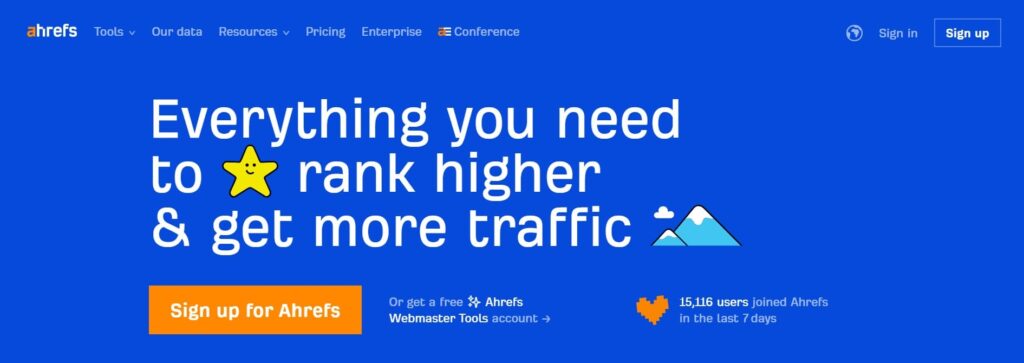
- Ubersuggest: Use Ubersuggest to discover new keyword ideas, analyze the competition, and understand which content performs best in your industry.
- SEMrush: SEMrush provides comprehensive data on keyword rankings, search volumes, and competitive analysis, helping you identify the most effective keywords to target.
- Google Trends: Google Trends allows you to explore trending topics and see how search volumes for specific keywords change over time, helping you stay ahead of industry trends.
- Google Search Console: Google Search Console provides insights into how your website performs in search results, helping you identify which keywords are driving traffic to your site and which areas need improvement.
- Ahrefs: Ahrefs offers powerful keyword research tools, competitor analysis, and backlink tracking to improve your website’s SEO performance.
- Moz Keyword Explorer: Moz Keyword Explorer helps you find the best keywords to target by providing accurate search volume data, keyword difficulty scores, and SERP analysis.
- AnswerThePublic: AnswerThePublic visualizes search questions and autocomplete data, revealing the most common queries related to your keywords to help you create relevant content.
- KWFinder: KWFinder is user-friendly and provides detailed keyword analysis, including search volumes, trends, and competition levels, making it easy to find profitable keywords.
- SpyFu: SpyFu allows you to see the keywords your competitors are using, track their rankings, and uncover profitable keyword opportunities for your hotel website.
- KeywordTool.io: KeywordTool.io generates long-tail keyword suggestions for various platforms, including Google, YouTube, and Bing, to help you optimize your content across multiple channels.
3. Tailor Your Content
Address specific pain points: Use your research to write a copy that addresses the specific concerns and desires of your guests. Highlight features that they care about most, such as amenities, location benefits, or special offers.
Create a connection: Write in a way that makes your guests feel understood and valued. Use a conversational tone and personalize the content to make it relatable.
Establish goals for every web page
Establishing clear goals for every web page on your hotel’s website is crucial for guiding your visitors toward the actions you want them to take. After conducting thorough research, you’ll have a solid understanding of what your ideal guests are looking for.
This knowledge allows you to create web pages that cater directly to their needs and preferences, making it easier for them to find the information they need and take the next step.
- Checking Availability and Prices: Ensure that visitors can easily check room availability and prices. This is a primary goal for many guests who are ready to book or compare rates.
- Booking Rooms or Beds: Streamline the booking process to make it as simple and quick as possible. The ultimate goal of many visitors is to secure a reservation, so your website should facilitate this effortlessly.
- Checking Your Facilities: Highlight your hotel’s facilities and amenities. Guests often want to know about features like the pool, gym, spa, or dining options, so make this information readily accessible.
- Reviewing Policies: Clearly present your policies, such as those regarding pets, cancellations, or check-in/check-out times. This helps guests feel informed and confident in their decision to book.
- Exploring Hotel Events and Activities: Showcase any special events, activities, or entertainment options your hotel offers. This is particularly important for families or guests looking for a unique experience during their stay.
- Catering to Different Guest Segments: Tailor your web pages to different guest segments such as business travelers, families, backpackers, and digital nomads. Each group has specific needs and priorities, so addressing these directly can enhance their user experience.
How to Write Good Copy for Your Hotel Website?
Writing good copy for your hotel website is essential for attracting and converting potential guests. Here’s how to create compelling content that engages your visitors and drives bookings:
1. Home page: the online front door of your hotel
Your home page is the first impression many visitors will have of your hotel. It should be welcoming and informative, giving them a reason to stay and explore further. Start with a strong, clear headline that immediately tells visitors what your hotel is about and what makes it unique.
This could be a tagline that highlights your main selling point or a benefit that sets you apart from competitors. Use subheadings to break up text and make it easier to read, guiding visitors to the most important sections of your site.
Write concise, persuasive content that highlights the benefits of staying at your hotel. Focus on what makes your hotel special, such as unique amenities, location, or exceptional service. Include clear calls to action (CTAs) that guide visitors toward making a booking. Phrases like “Check Availability,” “Book Now,” or “Explore Rooms” can encourage visitors to take the next step.
Learn more about hotel website structure: How to Create a Captivating and Effective Hotel Website
2. Write for one person: second-person narrative
Address your readers directly using “you” to create a personal connection. This makes the copy feel more engaging and relevant to each individual visitor. Show empathy and understanding of your guests’ needs and desires.
Use your copy to demonstrate that you know what they are looking for and that your hotel can meet those needs.
3. Create an irresistible offer (with promise – guarantee)
Promote any special offers or packages that provide added value to your guests. This could include discounts for direct bookings, complimentary breakfast, or exclusive access to hotel amenities.
Offer a satisfaction guarantee to reassure potential guests. For example, promise a room upgrade or money-back guarantee if they are not satisfied with their stay.
4. Use Visuals and Social Proof
Visual content and social proof play crucial roles in making your hotel website more appealing and trustworthy. Here’s how to use them effectively:
- High-Quality Photos and Videos
Including professional photos and videos that showcase your hotel’s best features is essential. High-quality visuals capture the beauty and atmosphere of your hotel, giving potential guests a glimpse of what to expect.
For instance, the Four Seasons website uses stunning, high-resolution images and videos to highlight their luxurious rooms, exquisite dining options, and picturesque locations. This visual appeal entices visitors and makes them dream of experiencing the luxury firsthand.
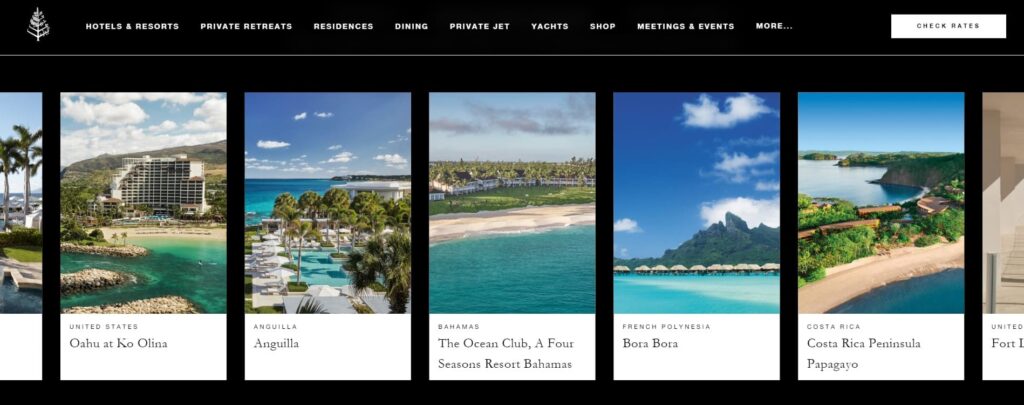
- Virtual Tours
Offer virtual tours of your hotel to provide an immersive experience for visitors. This allows them to explore your facilities from the comfort of their own home.
The website of The Peninsula Hotels features virtual tours that let visitors navigate through their rooms, restaurants, and amenities, enhancing transparency and trust.
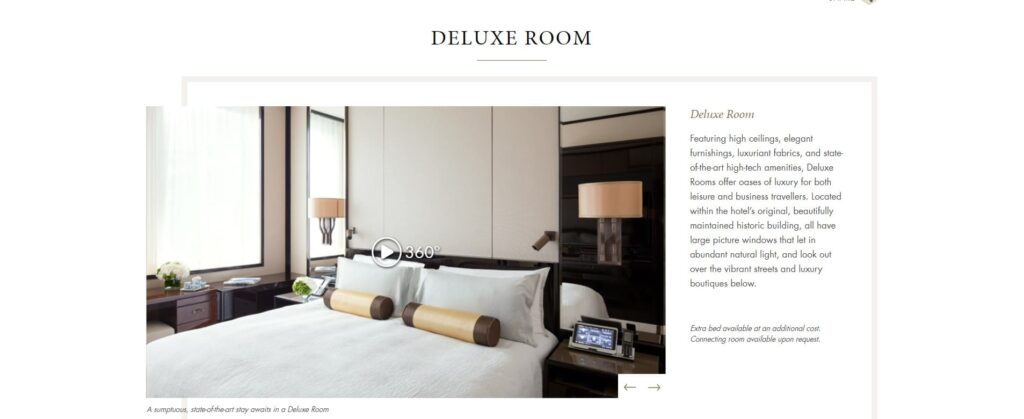
- Guest Testimonials and Reviews
Feature testimonials and reviews from past guests prominently on your website. These authentic experiences build trust and credibility.
The Marriott Hotels website includes a dedicated section for guest reviews and testimonials, often accompanied by photos of the guests enjoying their stay, adding a personal touch to the feedback.
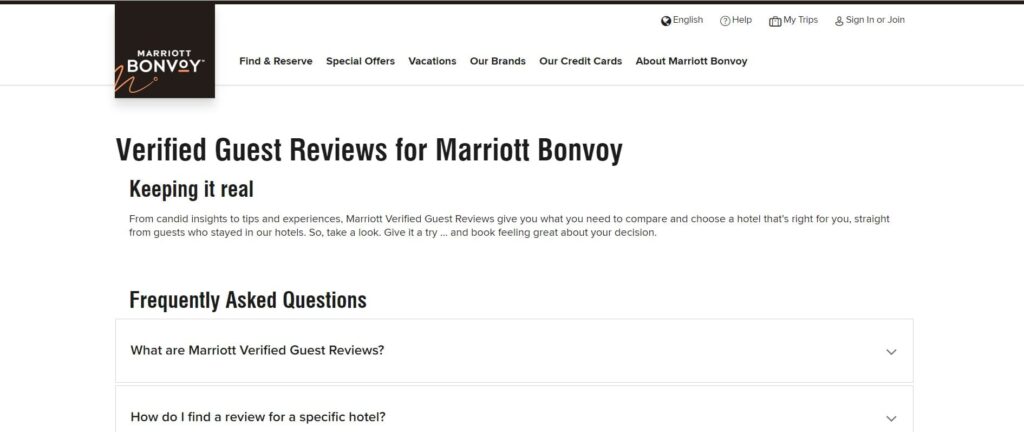
- Social Media Integration
Integrate social media feeds showcasing guest photos and posts about their stay at your hotel. This user-generated content acts as powerful social proof.
The Kimpton Hotels website features an Instagram feed displaying guests’ photos, providing real-life endorsements of the hotel experience.
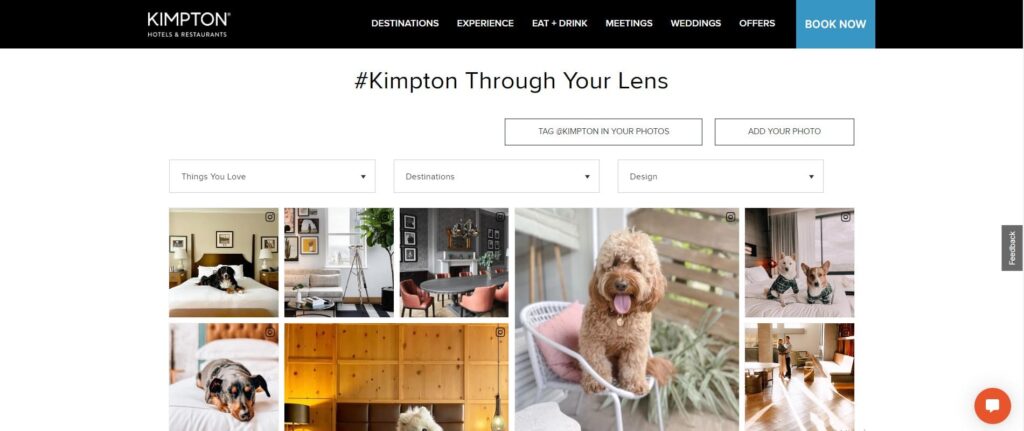
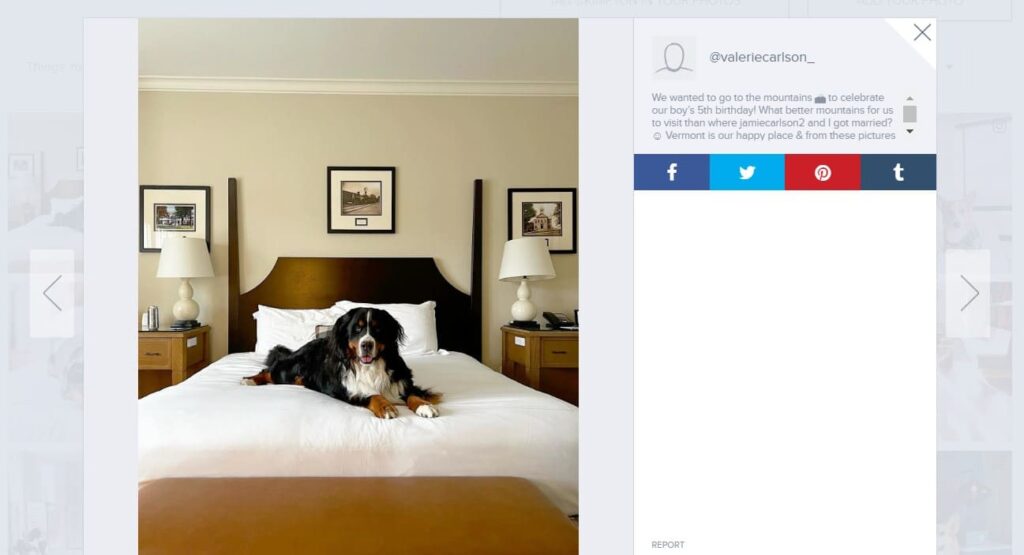
- Awards and Recognitions
Highlight any awards or recognitions your hotel has received. This builds credibility and assures potential guests of your quality and service.
The Ritz-Carlton website prominently displays their numerous awards and accolades, reinforcing their reputation as a world-class hotel brand.

5. Your Website Headline is the Most Important Piece of Copy
A compelling headline is one of the most critical elements of your hotel website. It’s the first thing visitors see, and it sets the tone for their entire browsing experience. A good headline captures attention, communicates your hotel’s unique value proposition, and entices visitors to explore further.
Include a benefit or solution to a problem (it answers the question: what’s in it for your ideal guest?)
It needs to be so clear that online visitors understand it in the first 5 seconds.
Here’s why a strong headline is essential and some great examples from real hotel websites:
- Captures attention: A strong headline grabs visitors’ attention immediately, making them want to learn more about your hotel.
- Communicates value: Your headline should clearly convey what sets your hotel apart from the competition. Whether it’s a unique location, luxurious amenities, or exceptional service, the headline needs to highlight your key selling points.
- Encourages exploration: A well-crafted headline piques curiosity and encourages visitors to explore your website further. It acts as a gateway to the rest of your content, guiding them toward booking a room or learning more about your offerings.
- Sets the tone: The headline sets the tone for your entire website. Whether your hotel offers a relaxing retreat, a business-friendly environment, or an adventure-filled stay, the headline should reflect this atmosphere.
Examples of Effective Boutique Hotel Website Headlines
Boutique hotels offer unique and personalized experiences that set them apart from larger hotel chains. Here are some examples of compelling headlines that capture the essence of boutique hotels, each tailored to highlight their distinctive features and appeal:
1. The Greenwich Hotel
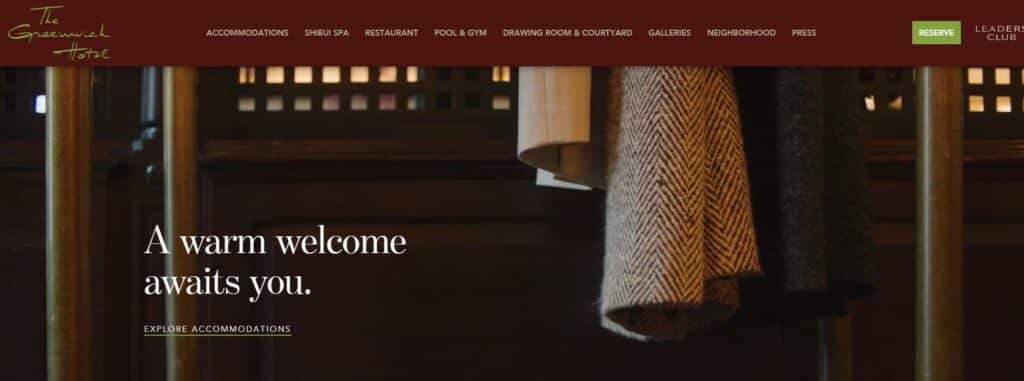
Headline: “A warm welcome awaits you”
Why It Works: This headline conveys a sense of hospitality and comfort, promising a homey and inviting atmosphere for guests right from their arrival.
2. The London EDITION
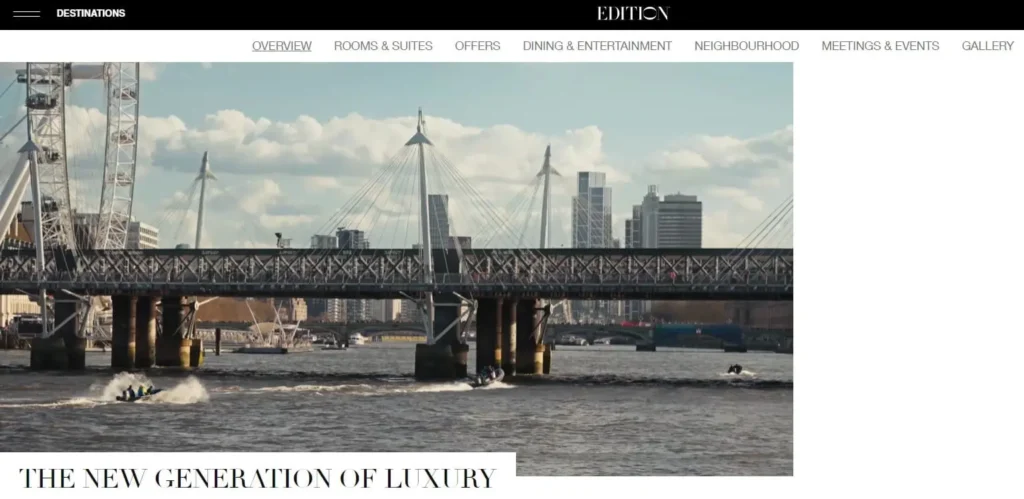
Headline: “The new generation of luxury”
Why It Works: This headline positions the hotel as a modern and innovative luxury destination, appealing to travelers who seek contemporary elegance and sophistication.
3. The Bowery Hotel
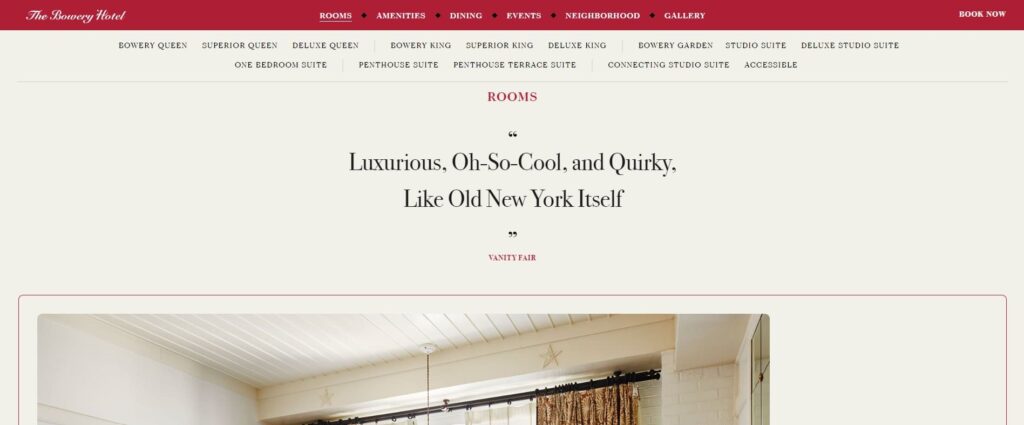
Headline: “Luxurious, Oh-So-Cool, and Quirky, Like Old New York Itself”
Why It Works: This headline emphasizes the hotel’s unique blend of luxury and quirkiness, evoking the charm and character of old New York, which appeals to those looking for a distinctive and memorable stay.
4. The Whitney Hotel
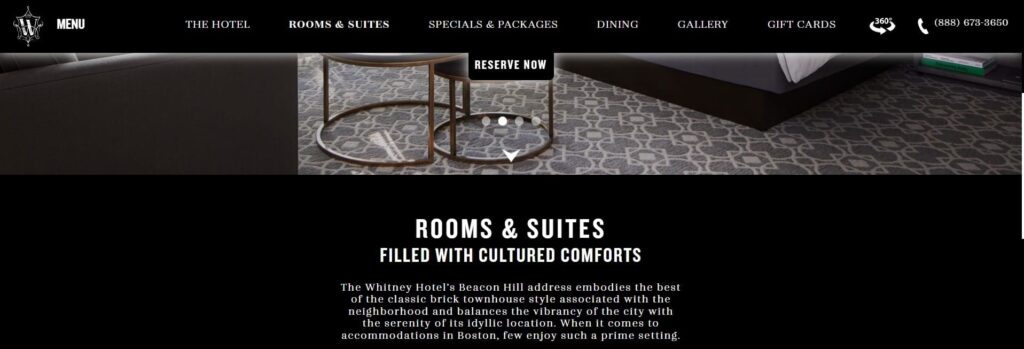
Headline: “Rooms and Suits: Filled with Cultured Comforts”
Why It Works: This headline highlights the refined and cultured atmosphere of the hotel’s accommodations, attracting guests who appreciate thoughtful and comfortable design.
5. The Dean Hotel
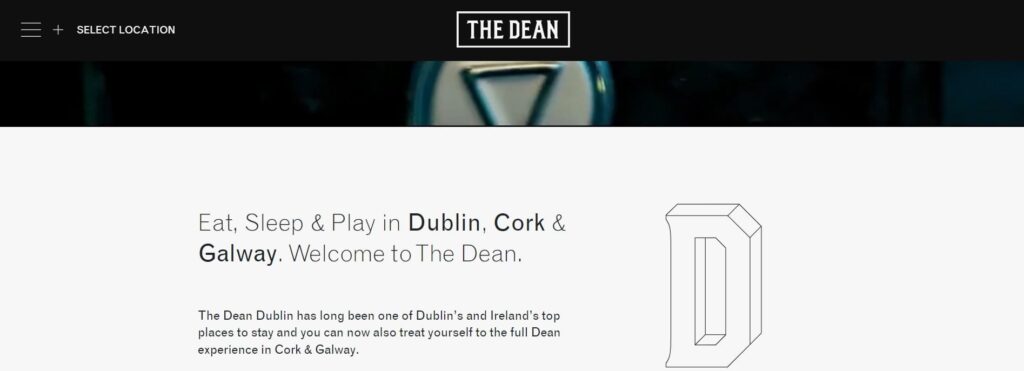
Headline: “Eat, Sleep & Play in Dublin, Cork & Galway. Welcome to The Dean”
Why It Works: This headline clearly communicates the hotel’s locations and encourages guests to experience a full range of activities, creating a sense of adventure and comprehensive hospitality.
6. The Charleston Place
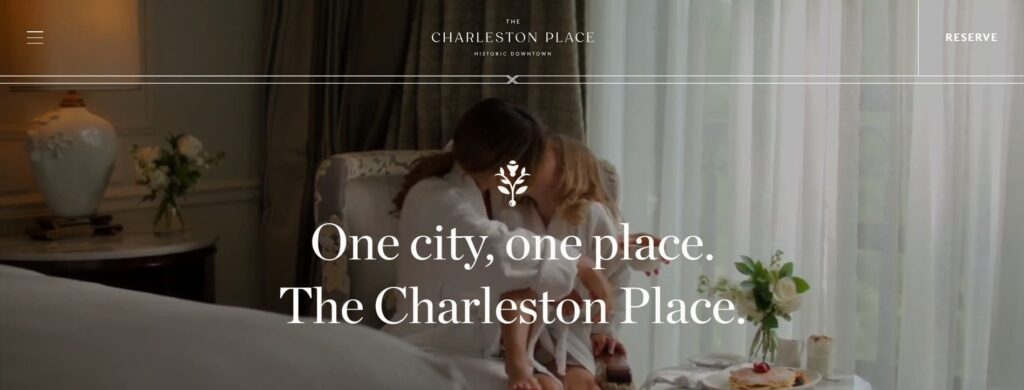
Headline: “One city, one place.
The Charleston Place.”
Why It Works: This concise headline creates a strong identity for the hotel, linking it closely with the city and suggesting it as the definitive place to stay in Charleston.
7. The Noelle
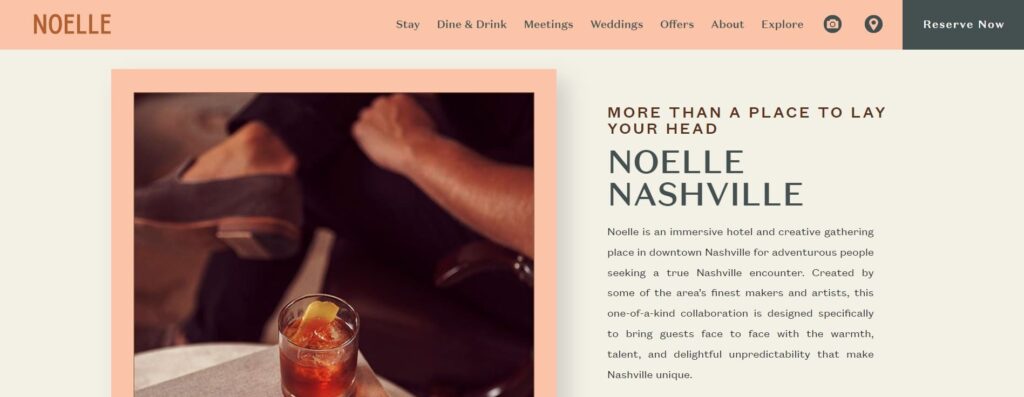
Headline: “More than a place to lay your head”
Why It Works: This headline suggests that staying at the hotel is an experience in itself, offering more than just a bed but a full and enriching stay.
8. The Line Hotel
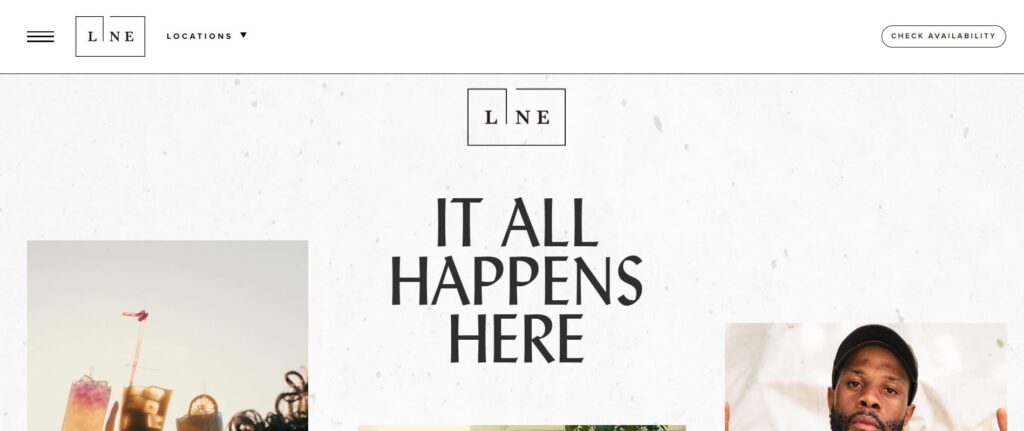
Headline: “It all happens here”
Why It Works: This headline creates a sense of excitement and activity, implying that the hotel is a central hub for events and experiences, attracting guests looking for a lively and engaging stay.
9. The Zetter
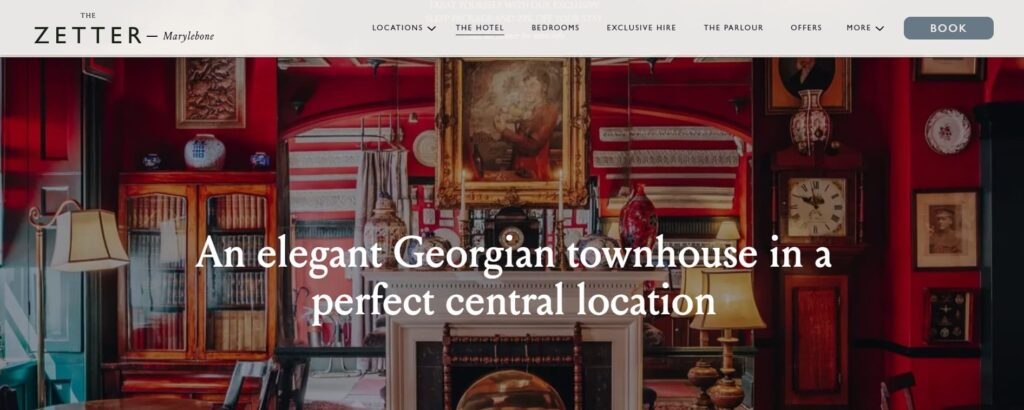
Headline: “An elegant Georgian townhouse in a perfect central location”
Why It Works: This headline highlights the hotel’s elegant architecture and prime location, appealing to guests who value both style and convenience.
10. The Beekman
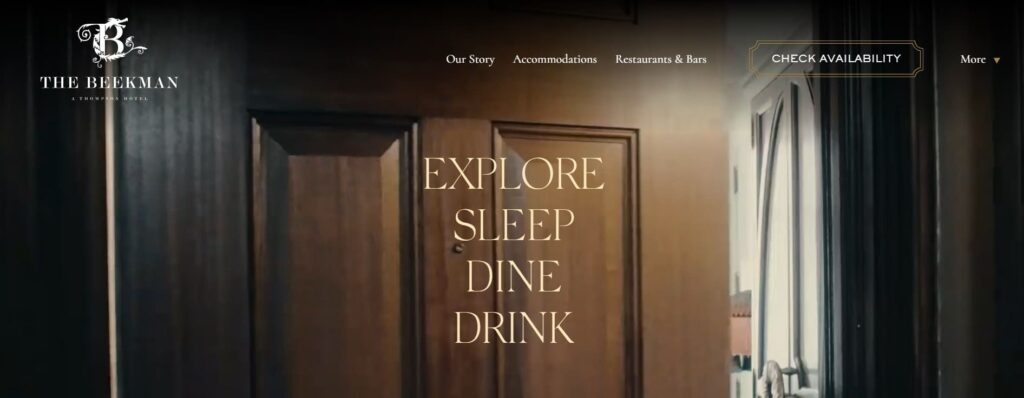
Headline: “Explore, sleep, dine, drink”
Why It Works: This headline succinctly captures the diverse experiences available at the hotel, promising a well-rounded and immersive stay.
These examples showcase how boutique hotels can use creative and compelling headlines to attract their target audience, communicate their unique value propositions, and entice visitors to explore more about what they offer.
6. The Importance of Microcopy in Hotel Websites
Microcopy refers to the small bits of text that guide users through your website, enhance their experience, and help them complete tasks. While often overlooked, microcopy plays a crucial role in hotel websites, where the primary goal is to convert visitors into guests. Here’s why microcopy is so important and how it can make a significant difference:
1. Enhancing User Experience
Microcopy provides clear and concise instructions, helping users navigate your website effortlessly. Whether it’s booking a room, signing up for a newsletter, or finding contact information, well-crafted microcopy ensures users know exactly what to do next.
For instance, buttons labeled “Check Availability” or “Book Now” clearly guide visitors toward making a reservation. Effective microcopy also addresses potential user concerns and reduces hesitation. By anticipating questions or doubts, you can provide reassurance and keep users engaged. Including a brief note like “No credit card required for reservation” can alleviate concerns about upfront payments.
2. Building Trust and Credibility
Microcopy can help build trust by being transparent about policies, procedures, and additional costs. Clear explanations about cancellation policies, fees, or check-in/check-out times can make users feel more secure.
For example, a tooltip next to the room rate that explains “Includes all taxes and fees” builds confidence in the pricing transparency. Additionally, microcopy allows you to inject personality into your website, making it more relatable and friendly. A warm, welcoming tone can make visitors feel more comfortable and connected to your brand. A confirmation message that says “We’re excited to host you!” adds a personal touch to the booking process.
3. Improving Conversion Rates
Persuasive microcopy can nudge users towards taking desired actions. Strategic placement of action-oriented text can significantly improve conversion rates. A subtle prompt like “Only 2 rooms left at this price!” creates a sense of urgency, encouraging quicker bookings. Highlighting the benefits of taking action can motivate users to proceed.
Microcopy that emphasizes the value or advantages of booking directly through your website can drive conversions. For example, text like “Book direct for the best rates and free breakfast” can convince visitors to choose direct booking over third-party platforms.
4. Reducing Errors and Enhancing Usability
Clear and instructive microcopy can prevent user errors by providing necessary guidance and information at critical points. Form field hints like “Enter your email address (e.g., [email protected])” can reduce submission errors.
Well-written microcopy improves accessibility by making your website easier to navigate for all users, including those with disabilities. Instructions and labels should be straightforward and easy to understand. Alt text for images that describes the content clearly aids visually impaired users who rely on screen readers.
5. Strengthening SEO
Microcopy can help improve your website’s SEO by including relevant keywords naturally within the text. This can boost your site’s visibility and attract more visitors. Descriptive headings like “Luxury Suites with Ocean Views” not only guide users but also improve search engine rankings.
Engaging microcopy keeps visitors on your site longer, reducing bounce rates and signaling to search engines that your site provides valuable content. Interactive elements like “Explore Our Amenities” with engaging microcopy encourage users to spend more time on your site.
Conclusion
We have covered all the essential hotel website copywriting points, from crafting compelling headlines and engaging microcopy to using high-quality visuals and leveraging social proof. These elements play a vital role in attracting and converting visitors into loyal guests.
However, if you need assistance or want to ensure your website is as effective as possible, you can always contact our professionals at DesigningIT for expert help. We are here to support you in creating a standout hotel website that drives results.

